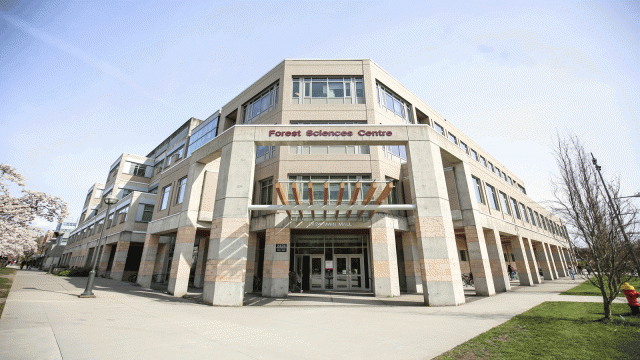Canada is well-positioned to seize opportunities in the emerging bioeconomy because of its global leadership in forestry and agriculture, access to biomass, and skilled workforce. The Bioeconomy Sciences and Technology is the country's first comprehensive program focused on the growing bioeconomy.
Why this program?
- Be part of Canada’s first comprehensive program focused on the growing bioeconomy
- Study the scientific, economic, and policy issues related to the bioeconomy and sustainability
- Experience a mix of classroom lectures and hands-on learning through labs and field trips
Program information
Send details- Campus: Vancouver
- Faculty: Faculty of Forestry
- Degree: Bachelor of Science in Natural Resources
- Length 4 yrs
-
Co-op
Yes
You can combine your studies with full-time, paid work at top local and international organizations.
-
Honours
No
You can study intense specialization in a single field.
Bioeconomy refers to the parts of the economy that involve the production of renewable biological resources (e.g., wood, plants, wood waste, and organic waste) that are transformed into valuable products (e.g., biofuels, bioplastics, textiles, food additives, and medicine).
UBC Forestry’s Bioeconomy Sciences and Technology is the first program in Canada to provide a multidisciplinary and comprehensive education that’s focused on the scientific, economic, and policy issues related to the growing bioeconomy and creating a sustainable future. As a student in this program you’ll gain a solid foundation for the innovative design and development of renewable materials, energy, and sustainable land-use strategies.
Experiential learning and research
As a Bioeconomy Sciences and Technology student, you’ll gain hands-on learning through labs, field trips, and a capstone project. You also have the option to minor in Commerce.
Campus features
UBC’s Vancouver campus is home to the Centre for Advanced Wood Processing, Canada’s national centre of excellence for wood products, and the BioProducts Institute, a research cluster focused on viable pathways from renewable and sustainable biomass to bio-based materials, chemicals, and fuels.
The Faculty of Forestry also has two major research forests in British Columbia, totalling 15,000 hectares or more than 30,000 acres.
Send detailsLife at UBC's Vancouver campus
Surrounded by 750 hectares of forest, UBC offers the chance to study in a forested environment. Learn from award-winning faculty members in the nature-inspired Forest Sciences Centre, whose main atrium and study area feature giant live plants and a large skylight supported by massive wood beams. As a Faculty of Forestry student, you'll also have access to two research forests for field schools and other learning opportunities.
Find out moreYour future
By 2030, there will be up to 1 million new bioeconomy jobs in the European Union alone. As a Bioeconomy Sciences and Technology graduate, you will be familiar with key facets of the bioeconomy and possess the skills required to work in energy, design and develop renewable materials, and establish leading land-use strategies. Possible job titles include:
- Energy engineer
- Community energy specialist
- Biomass conversion and processing technologist
- Product sustainability specialist
- Carbon compliance specialist
- Technology development advisor
- Environmental sustainability consultant
- Fermentation scientist
- Laboratory operator
Program requirements
English-language requirements
English is the language of instruction at UBC. All prospective students must demonstrate English-language competency prior to admission. There are numerous ways to meet the English Language Admission Standard.
General admission requirements
IB Diploma Programme
- Completed IB Diploma, including at least three Higher Level courses.
IB Certificate Courses
- IB Certificate courses (Standard and Higher Level) may be used in an admissions average if you are graduating from a recognized high school curriculum that can be used as your basis of admission.
- IB Math Applications and Interpretations SL, or IB Math Studies, do not satisfy the math requirement for admission to UBC’s science-based programs, the Faculty of Management, the UBC Sauder School of Business, or the Vancouver School of Economics.
Degree-specific requirements: Natural Resources
- IB Math Analysis and Approaches SL or HL, or IB Math Applications and Interpretations HL. (IB Math Applications and Interpretations SL, or IB Math Studies, are not acceptable.)
- One of IB Biology, IB Chemistry, or IB Physics (see Related courses below)
- Grade 11 or equivalent Chemistry
- Grade 11 Biology (see Related courses below)
- If you intend to major in Wood Products or specialize in Harvest Planning and Engineering (Forest Operations), Physics 11 is strongly recommended.
Note: Grade 11 Biology, Chemistry and Physics requirements listed above are only relevant to students who are not completing the equivalent IB Diploma Biology, Chemistry and/or Physics courses. For students studying outside of Canada, some examples of courses that may be accepted as Grade 11 equivalents are junior-level courses for American students, and IGCSE and O Level for those following British-patterned curricula.
Related courses
The following subject categories are particularly relevant for this degree. Consider taking courses in these areas in Grade 11 and Grade 12.
- Language Arts
- Mathematics and Computation: Calculus is recommended for the Harvest Planning and Engineering specialization.
- Sciences: Biology 11 or IB Biology HL or SL is strongly recommended for all majors and specializations. IB Physics SL or HL is also recommended for the Wood Products major and the Harvest Planning and Engineering specialization.
“
